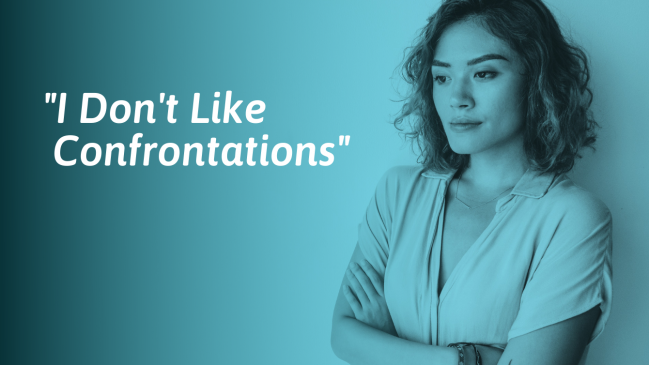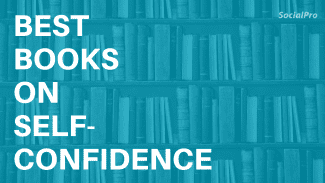“I’m afraid of confrontation. I start to panic when someone disagrees or argues with me. How can I become more comfortable with conflict?”
Occasional conflict between friends, partners, family, and colleagues is normal. Although it can be stressful, conflict can even be beneficial; if you handle it the right way, it can resolve problems and make a relationship stronger.[1] In this guide, you’ll learn why you might be afraid of conflict and how to overcome your fear.
Why you might be afraid of confrontation
Common causes underlying fear of confrontation include:
- Being worried that you won’t be able to get your point across; you might worry that you’ll look foolish in front of other people
- Fear of physical confrontation
- A desire to make other people happy, even if it’s at the expense of your own needs; you may see confrontation as a sign your relationship is failing
- A fear that the other person will force you to go along with a solution that you don’t agree with
- Fear of anger (either your own or the other person’s) or experiencing other overwhelming negative emotions, such as anxiety or feeling out of control
- Fear of blushing, crying, or shaking during a confrontation
Some of these reasons can stem from childhood experiences. For example, growing up in a family where destructive fights or confrontations occurred frequently can make you afraid to have difficult conversations with other people. Or, if your parents acted as though confrontation was completely unacceptable, you may never have learned how to face problems with other people head-on.
It’s natural to avoid things that we fear. But over the long term, avoidance may make you increasingly afraid to address problems with other people.
1. Check your assumptions about confrontation
Challenging any unhelpful, inaccurate beliefs you have about confrontation can make it feel less overwhelming.
Here are a few of the most common myths about confrontation:
Assumption: Other people are fine with confrontation. It’s easier for them than it is for me.
Reality: There are a few people who love an argument, but lots of people are conflict-avoidant. I’m not the only one who struggles to deal with confrontation.
Assumption: Conflict or confrontation means there’s something wrong with our friendship.
Reality: Conflict and confrontation are normal in relationships.[2]
Assumption: I can’t deal with confrontation. It’s just too overwhelming.
Reality: It’s true that confrontation can cause anxiety and panic, but I can learn to deal with these feelings. Conflict resolution is a skill that gets easier with practice.
2. Remind yourself of the potential benefits
Identifying exactly how a confrontation can improve your situation might help you focus on getting a good outcome instead of dwelling on your fear of conflict.
For example, if you have to confront a work colleague, it may help to remember that by sorting out your differences, you might both be able to enjoy a more peaceful office environment. It may help to make a list of reasons why confronting someone is a good idea, even if it will be difficult.
3. Understand how your body reacts to conflict
A fear of conflict can cause anxiety symptoms, including:
- Shallow breathing
- Sweating
- Racing heartbeat
- Nausea
- A feeling of detachment or that the world isn’t “real”
If you’ve previously had a panic attack during a confrontation, you might be reluctant to place yourself in any situation that could result in a conflict because you are scared to experience these symptoms again.
Fortunately, although they can feel awful, panic symptoms aren’t dangerous. When you realize that they are caused by your body’s natural stress response, they can seem less frightening.
It can help to learn how to calm yourself down. Practicing these steps in advance can help you feel more prepared to handle conflict:
- Take slow, deep breaths from your abdomen.
- Ground yourself in the moment by using your senses. Identify what you can see, smell, hear, and touch.
- Deliberately relax your muscles. Focus on one part of your body at a time.
- Remember that your body’s stress response usually wears off within 20-30 minutes.[3] you won’t feel panicky forever.
4. Prepare a statement that addresses the issue
When you know exactly what you want to discuss and have prepared an opening statement, you may feel less afraid of confrontation because you know precisely what you’re going to say.
Suppose your friend has turned up more than half an hour late the last three times you’ve hung out. You don’t want to confront them because you are afraid they will get upset and end your friendship. But you can’t overlook the fact they are often late, and you get resentful because they are acting in an inconsiderate way.
Use this formula:
- I feel…
- When…
- Because…
- In future…
You can adjust the language slightly, but try sticking to this structure. Focus on the other person’s observable behaviors, not their character traits, because it’s more realistic to ask for behavioral change than for someone to change their personality. Finish with a reasonable request for change.
In this case, you might say something like:
“I feel slightly disrespected when you turn up late because it feels like you don’t think my time is important. In the future, I’d really appreciate it if you called or messaged me when you’re running late.”
With practice, you’ll be able to use “I statements” without having to plan them in advance.
Start with relatively minor issues with people you trust. As you gain confidence, you can start addressing larger problems and confronting people who don’t make you feel particularly safe.
5. Prepare some potential solutions
If you’re worried that the other person will think you’re being unreasonable, it can help to think of some solutions to the problem in advance.
When you propose a solution, you are not simply expressing your feelings to the other person—you are offering to work as a team to think of an answer to your joint problem. This can make them less defensive and angry.
For example, if you need to confront your partner about why they aren’t doing their share of household chores, you could suggest a rota system. If you need to confront someone in the workplace because they keep stealing your parking spot, you could suggest one or two other places they could park their car.
6. Do your research in advance of a tough discussion
Doing some research in advance of a confrontation can help you stay focused on your desired outcome, which in turn can help you stay calm and get your point across. It’s a useful strategy if you’re worried that you won’t be able to speak coherently during a difficult discussion.
Let’s say you work as the head of a marketing department. In recent months, two members of senior management, Alex and Sarah, have been hinting that they want to end your annual internship program. You disagree because you believe it’s been very successful.
After a recent heated discussion about company priorities in the break room, the three of you have agreed to meet, talk, and come to a final decision.
Alex: I just think cutting back on the intern program would free up more time for everyone. It takes hours to show them the ropes.
Sarah: I agree. I know they can help out on projects, but I think the costs outweigh the benefits for me.
You: OK, I’ve got some data that might help us talk about this. I ran the numbers and found that since we began the intern program, we’ve actually cut the marketing budget by 7%. Our staff also say that acting as trainers to our interns has boosted their skill set and confidence. Does any of this make a difference to your opinion?
This tactic won’t always work because sometimes the other person will base their position on emotion, not logic. But if you can present a compelling, well-prepared argument, it may help them see your point of view.
7. See confrontation as an opportunity to learn
Try to get curious about what the other person thinks. Tell yourself, “I don’t have to agree with what they say, but it may be interesting to get their perspective.” This can help if you’re afraid of confrontation because you don’t like conceding to someone else’s point of view or being proven wrong.
It can help to ask the other person open-ended questions such as:
- “Why do you think that?”
- “When did you first come to that decision?”
- “How do you mean?”
Staying curious about the other person’s motives and feelings can prevent conflict from arising in the first place because asking thoughtful questions and listening carefully can resolve misunderstandings.
8. Learn how to express yourself assertively
If you’re afraid of being steamrolled during an argument, practicing assertive communication can help you feel more prepared.
Assertive communication skills can also help you resolve misunderstandings before they escalate into conflict because they help other people understand your needs and boundaries.
These skills will help you shut down unacceptable behavior in others before it becomes an ongoing problem. When you feel confident upholding a boundary, you may feel less intimidated by strong-willed people.
Our guides on how not to be a doormat and our article on how to get people to respect you contain practical advice on how to be more assertive.
9. Learn some de-escalation techniques
Knowing that you have the ability to de-escalate the situation can give you confidence during a confrontation.
To de-escalate a heated argument:
- Do not ask someone to “calm down” or “relax;” this will annoy most people
- Use open body language to create a sense of trust and safety; face the other person, make confident eye contact, and keep your palms showing. Do not point, as this can come off as aggressive
- Maintain personal space; stay at least one arm’s length away
- Stay at the same height as the other person; for example, if they are seated, remain seated
- Relax your facial muscles
- Speak at a measured pace at a steady pitch and pace
- Suggest a 5 or 10-minute time out if one or both of you is highly emotional
10. Ask someone to mediate the discussion
If you need to confront someone and the situation is volatile, it may be a good idea to ask a neutral third party to mediate the discussion. This applies to work rather than personal conflicts.
A mediator doesn’t tell you or the other person what to do. Their role is to encourage you both to speak calmly and clearly about your point of view and work together to resolve the issue amicably. Ask your HR department or a senior manager for advice on who can act as a mediator.
Using a mediator is a smart option if:
- You are afraid that the other person will become abusive
- The other person has a history of manipulating what other people say, and you want an impartial witness
- You have already tried to resolve the problem but can’t reach a solution
- The problem is time-sensitive, and you need to come to some kind of agreement as soon as possible. Using a mediator could save you from having multiple discussions because mediation can keep the discussion on track
Before asking someone to mediate, be honest with yourself. Do you really need a mediator, or do you want someone there as a human shield? If it’s the latter, work on your fear of confrontation instead of hiding behind a third party.
11. Think how you’d handle worst-case scenarios
If you know in advance how you’d respond to a realistic worst-case scenario, you may feel more confident.
Ask yourself:
- Realistically speaking, what’s the worst thing that could happen?
- How would I deal with it?
For example:
Possible scenario: My colleague loses their temper, yells abuse at me, and storms out.
Solution: I’d calm myself using deep breathing techniques. I’d then ask my manager for support and ask them for tips on how I should act around my colleague next time I see them.
Possible scenario: My friend doesn’t listen to me and says that our friendship is over.
Solution: I would try to see her point of view and apologize if I realized I’d done something to offend her. If we couldn’t work it out, I’d be sad, but eventually, I’d move on.
12. Roleplay with a trusted friend
Ask a friend to help you practice resolving conflict. If you need to prepare for a specific confrontation, give your friend some background on the other party, what the problem is, and how you expect the other person to behave. Give enough information to make the role play as realistic as possible.
This kind of roleplay isn’t a line-by-line rehearsal for genuine confrontation. But it can give you an opportunity to practice conflict de-escalation skills and practice summarizing your points.
Choose a friend who has experience of conflict, will take the role play seriously, and is assertive enough to challenge you. For example, they could raise their voice in anger or shoot you down when you propose a reasonable solution to a problem.
13. Take up a martial art
Some people find that learning a martial art or taking a self-defense course makes them feel more confident when they have to deal with heated confrontations. Google “[your area] + martial arts” to find classes.
It’s important to note that it’s usually better to remove yourself from a dangerous situation rather than fight. For many people, the benefit of taking up a martial art isn’t an ability to fight; it’s knowing that in the worst-case scenario, they can defend themselves. This knowledge can make you feel safer if someone becomes angry and aggressive.
Common questions about overcoming a fear of confrontation
Why do I have a fear of confrontation?
If you grew up in an environment where conflict was normal, you might be conflict-avoidant as an adult because confrontation has negative associations for you. You may also fear confrontation if you lack confidence, worry that people won’t understand you, or fear that they will ignore your wishes.
How do I stop being scared of confrontation?
Practicing assertive communication, preparing your points in advance of a difficult conversation, and working on improving your general self-confidence can help you feel less afraid of confrontation. Learning de-escalation techniques can also help you feel safer.
Is it bad to avoid confrontation?
It depends on the situation. In a volatile situation where there is a risk of violence, avoiding confrontation is the best course of action. But as a general rule, it is best to confront problems so they can be resolved as soon as possible.
How do you start a confrontation?
Begin by briefly describing the problem you need to discuss. Use “I” statements rather than “you” statements and focus on specific facts and behaviors rather than character traits or general complaints. If you think the other person will become angry, pick a safe place with other people nearby.
How can I avoid confrontation with someone who is emotionally agitated?
Remain calm. Showing too much negative emotion can escalate the situation. If they are very angry or upset, suggest taking a few minutes apart before talking. Listen closely and try to understand their position before offering your own points in return.
How can I avoid confrontation at work?
It isn’t possible to avoid all confrontations at work. However, using an assertive communication style, tackling misunderstandings as they arise, and backing up your points with data can help you solve problems in a civil way.







Some good tips. I find confrontation manageable if I have time to prepare. It’s spur-of-the-moment, “didn’t see that coming” situations that are extremely difficult for me — I find myself unable to find the right words to say and simply don’t know how to respond or handle the situation. Any tips on how to cultivate a quicker mind that’s ready to respond to problems at a moment’s notice?
Thank you very much for such a well-written article. During a crazy few months, I’ve now aged 53, realized that I have never been able to deal with conflict/confrontation in most situations. Although I’ve never been violent, I feel now I know why I have broken many inanimate things at home & totally run from problems with people – I think inside I’m scared of my own risk of violently losing control. I’ll be following several of the techniques shown here as well as techniques I’m learning from my wonderful behavioral specialist. Again, thanks for your help here 🙂
Loved the tips about de-escalation. Thanks!
Interesting, to me the fear of conflict might be one of the reasons for avoiding people